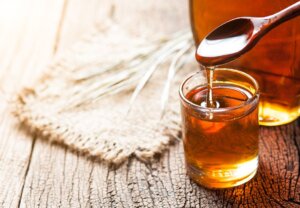Uncovering the Benefits of Brown Rice Syrup
Brown rice syrup – also called rice malt syrup or maltose syrup — is a vegan, fructose- and gluten-free liquid sugar substitute. It can often be found in Asian cuisine and many people find it a plant-based sweetener alternative to traditional refined sugar. It is made by cooking whole grain brown rice that’s been treated with enzymes to turn its starches into sugars, resulting in a sweet light brown syrup.
One tablespoon of brown rice syrup has 55 to 75 calories, depending on the brand; sugar has 48 calories per tablespoon. While half as sweet as sugar, brown rice syrup has a high glycemic index of 98 (compared to sugar’s 65) which means that it increases the blood glucose level more significantly after consumption. Brown rice syrup can be used as a sugar substitute in baking and cooking with some minor adjustments to the recipe to account for high moisture content and flavor.
Brown Rice Syrup is a Flexible, Versatile Sweetener
What makes brown rice syrup such an attractive ingredient in the wide range of products it can be used in as a substitute for high-fructose corn syrup – from candy and breakfast cereals to snack bars and ice cream. Brown rice syrup can be used in a one to one ratio as a substitution for high-fructose corn syrup, making it easy to incorporate this ingredient into food manufacturing processes from big scale producers to small local bakeries.
Additional applications for brown rice syrup include:
- Beverages
- Dairy and Non-Dairy
- Dressings and Sauces
- Frozen Desserts
- Frozen Meals
- Fruit Preps and Preserves
- Icings and Frostings
- Infant and Toddler Nutrition
- Margarine and Spreads
- Meat and Meat Substitutes
- Pet and Animal Nutrition
- Prepared Meals
- Sweet and Savory Snacks
- Snacks
- Soups
- Nutritional Supplements
- Supplements

Brown Rice Syrup vs. High-Fructose Corn Syrup
Unlike high-fructose corn syrup, rice syrup contains only glucose, rather than fructose. Ongoing studies have suggested that the consumption of fructose (particularly in corn syrup) could have a direct role in the causation of the obesity epidemic. In fact, high fructose corn syrup now makes up more than 40% of caloric sweeteners added to food and beverages in the United States. As consumers become more health conscious, seeing high fructose corn syrup on a label could immediately turn them away.
As a one-to-one substitute, brown rice syrup offers an easy way for food producers to appeal to their health minded customers without compromising on flavor. Some people even prefer the slightly nutty flavor that brown rice syrup can add to foods and beverages.
Additionally, brown rice syrup can be used just like any other liquid sweetener such as honey, maple syrup, or stevia. Many people enjoy adding it to their coffee or tea or as a dessert topping.
Brown Rice Syrup is More Than a Sweetener – It Sticks Too!
Brown rice syrup doesn’t just sweeten, it can also act as a binder, humectant, browning agent, flavor enhancer, and texture modifier. Its moisture-retaining properties make it ideal for soft-baked goods, while its binding ability enhances granola bars and cereals. Additionally, brown rice syrup caramelizes faster than sugar, which may require recipe adjustments to prevent over-browning. Products made with brown rice syrup often have improved:
- Chewiness
- Crispiness
- Crystal Control
- Fat Replacement
- Freeze Thaw Stability
- Low-Tack Coating
- Mouthfeel
- Extended Shelf Life
- Thickening
- Water Activity Control
- Yeast Fermentation
Conventional non-GMO brown and clarified rice syrups are available in the same DE levels. In most cases, lower DE syrups have a higher viscosity and a lower sweetening power, while higher DE syrups have a lower viscosity and higher sweetening power.
If you’re a food or beverage manufacturer either looking for a reliable supply of brown rice syrup, or you’re considering how this healthy corn syrup alternative can be used in your products, we’re here to help! Our ingredients experts are always happy to discuss your individual needs and how a product like rice syrup might fit into your recipes. Contact us to start using brown rice syrup in your delicious foods!
Frequently Asked Questions:
Does brown rice syrup affect baking differently than other sweeteners?
Yes, brown rice syrup behaves differently than other liquid sweeteners in baking because of its high moisture content and lower sweetness. When using brown rice syrup in baked goods:
- Reduce other liquids slightly to maintain proper texture.
- Use a bit more syrup to achieve the desired sweetness, since it’s only half as sweet as sugar.
- Expect chewier, denser results, as brown rice syrup acts as a humectant, locking in moisture and extending shelf life.
Does brown rice syrup contain arsenic?
Like other rice-based products, brown rice syrup may contain trace amounts of arsenic, as rice naturally absorbs arsenic from soil and water. However, levels vary depending on sourcing and processing methods. Some manufacturers use low-arsenic rice varieties or filtration methods to minimize arsenic content, so it’s best to look for brands that conduct third-party testing to ensure safety.
Is brown rice syrup a good substitute for maple syrup or agave?
Yes, brown rice syrup is a fine substitute for maple syrup or agave in most recipes, but adjustments may be needed. Brown rice syrup is less sweet than both maple syrup and agave, so you may need to use more to achieve the same sweetness. Additionally, since brown rice syrup has a thicker consistency, it may affect the texture of certain baked goods or sauces.
Does brown rice syrup expire?
Brown rice syrup has a long shelf life, typically up to a year when stored in a cool, dry place. Over time, it may thicken or crystallize, but warming the syrup slightly can help restore its consistency. Always check for changes in color or odor, as these could indicate spoilage.
